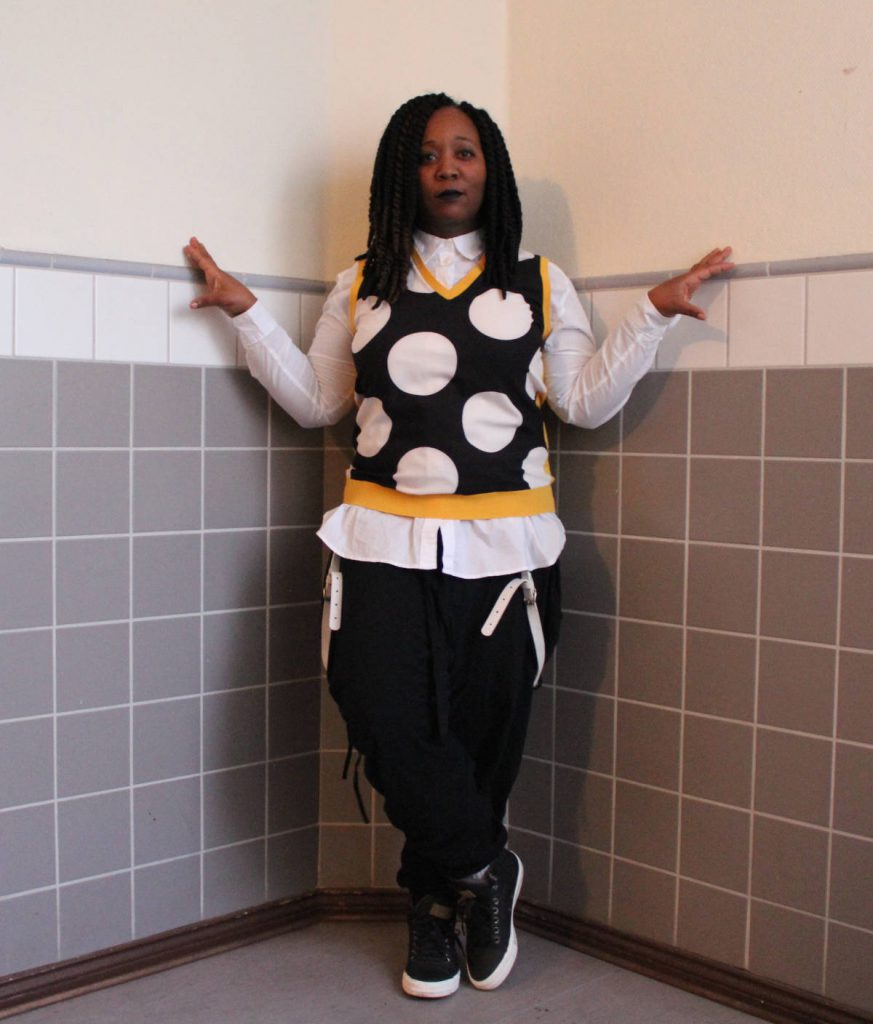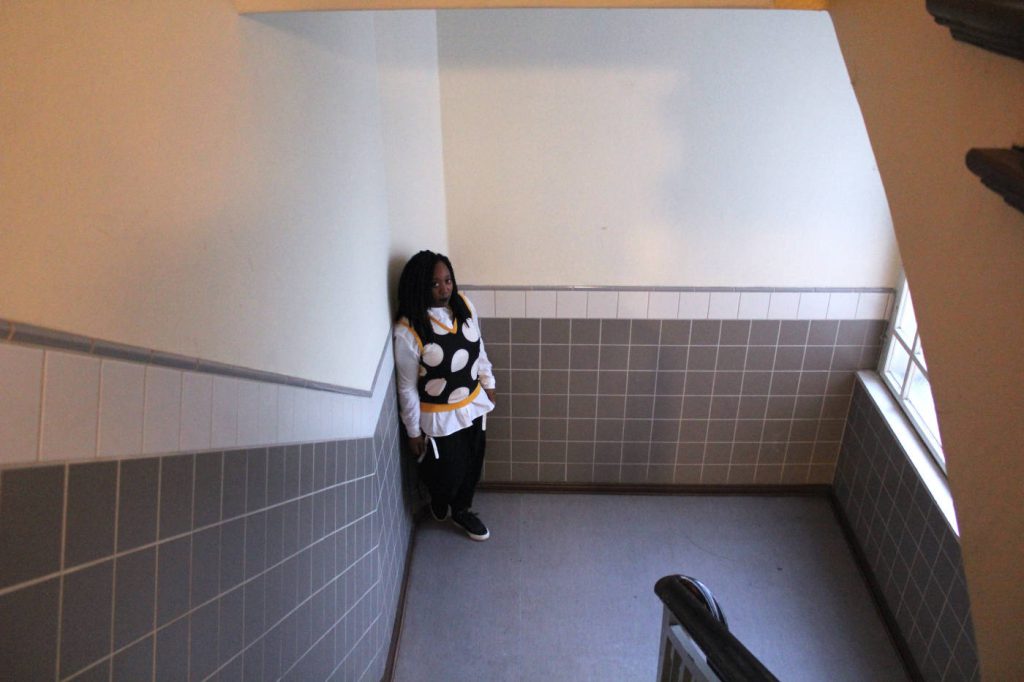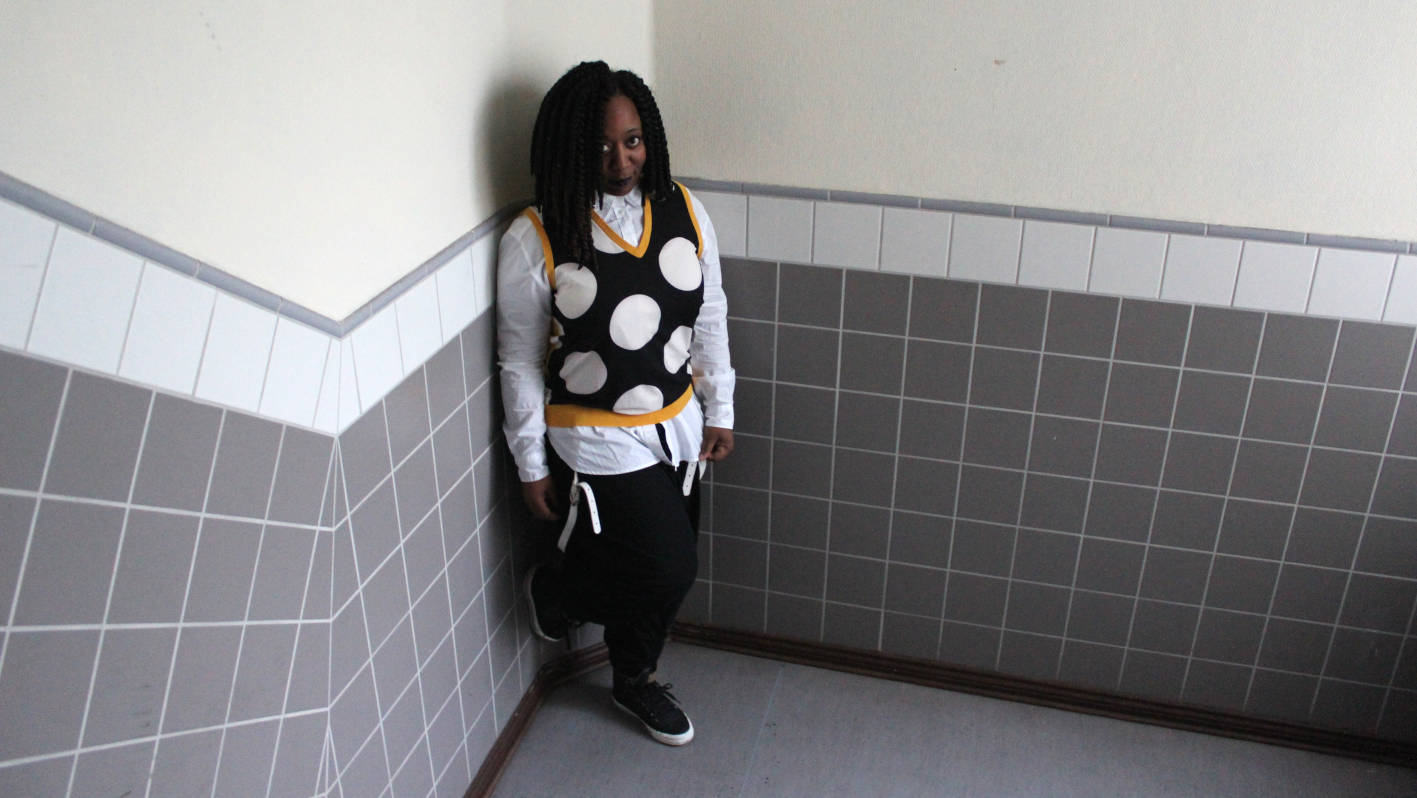Sky Deep (All pictures: Angel Ka)
Sky Deep is everything but a one-trick Pony. Hailing from the US, she has established herself as a versatile artist in Berlin’s vibrant and fought over music scene. Not only did she manage to do so by making effervescent House and Techno tracks, but by drawing from a diverse musical background including Rock’n’Roll, Hip Hop and Gospel. It’s not music only though, since she’s setting out to become a full-on multimedia artist with her next project, a 360 degree music video for her new single Up In Here followed by a VR mini-game experience later this winter, already on the way.
Being vocal about politics as well, she’s not hesitating to address social injustice and racism, particularly in the music industry, when we meet on a sunny afternoon on the banks of Spree river in Berlin. During our chat, Sky Deep explains why music is first and foremost a physical affair, why fundamental changes are due in the scene and how whole music genres were slowly but steadily taken away from their Black origins and whitewashed in the following.
In your work, you rely on body language and improvising together more than scales and music theory. You even gave workshops on improvising. How would you teach people that?
By providing a space where people get the chance to try it out. Even the tiniest exercise helps. Like clapping together. Everybody can do it, but how do you know when to speed up or slow down if you’re doing it with other people? How do you prepare people for doing something else? There’s eye contact for example. I would give two people the task to clap together and speed up the tempo and then slow back down.
So it’s a lot about chemistry as well.
Sure. But it’s more about listening and communicating. If you have chemistry already, then it probably happens a bit faster. If there isn’t chemistry, you have to learn how to observe the others while doing your own stuff and join them on the journey. When it happens, it’s really magical. As a DJ, I have to do it all the time. Seeing if people are happy with the music the way it is or if they need something else.
Can you imagine a combination of instruments that would be the easiest one to do it?
(chuckles) With my background of coming from a church, there was always a guitar, a keyboard, a piano or an organ and bass and drums. And vocals, of course. That’s why I often envision these straight forward band configurations. But because I’ve gotten so much more into electronic music, the idea of being able to do this with controllers and Ableton or a synthesizer intrigues me. Being able to set up patches or filters, things that still allow you to improvise on the fly even if you’re with a band.
Sky Deep takes her creativity for a walk.
When did this work particularly well for you?
Something pretty cool happened when I was on tour with Peaches last summer or so. I played laser harp and guitar back then, I ran the playback and all the midi cues. One of my key instruments was the Akai MPC. At the end of bowing and curtain call and all this, some band members decided to start jamming all of a sudden. One night, I was able to dial in a program with my drum machine and played something with them, unrehearsed. This felt really good. I’d be happy to encourage more freedom like that in musicians that are shy about freestyling.
Are you shy about that?
I used to and still am. I started out with Hip Hop where people go like ‘Bust a rhyme for me right now, go!‘ I told them that I’m more of a writer and wasn’t too certain about the freestyle thing. But they made me try it and, to be honest, I didn’t always do so well. Until I realised that it’s ok to have a little bit of a structure in your mind that you can recall in special situations.
I figure improvising in front of an audience is arguably the hardest part in being an artist. How hard is it to stand on a stage nakedly, without having your whole show prepared?
I did a workshop for Ableton some time ago. It was a big jam session with around 20 people. We rotated to give everybody a chance. It was full and there were good vibes, I’m constantly encouraging people to get out of their minds and into their bodies. If you feel like you want to play something different, move your body differently. If someone demands for a groove, you’ll probably find it in your hips somewhere. Don’t get trapped in your mind all the time!
Is this physical approach helpful for DJing as well?
It depends. Some DJs play with loops or clips when they’re transitioning, others like to cut in parts of another beat in the middle of whatever they’re playing. The question is if you’re able to have fun. How well do you know your instrument? Can you just be free with it? If you’re just a selector, that’s also pleasant. But it’s totally possible to musically be a DJ. I was playing in bands before I started DJing and approached it with the same mentality when I started. If I don’t think I see a certain type of body movement from the crowd, I have two choices: I can be stuck in my head and think about which track would work best. Or I ask myself what feels right. Maybe I don’t see enough people shaking their asses, they’re all in their shoulders. Or it’s that time at night where everybody’s floating. Maybe I need to bring them back to the ground. I literally choose music based on the groundedness factor. Do I feel myself planted? If people are closing their eyes or going to the bar it’s maybe time to bring them back from floating.
How do you do this?
First, I have to know if the record is capable of doing the job. I have to see how it affects my body. Does it make me feel how I want them to feel? If so, then we try to go there. It’s an experiment, but very similar to the improvisation I have when playing with other musicians. Except there’s people moving and dancing and I’m playing the music. Either way, it takes me out of my head and into a place of feeling. And trying to feel what other people feel.

This fits in with your improvisational perspective. In an interview, you stated: ‘I’ve only learned a few rules in music. Just enough to knowingly break them when desired.’ Which rules do you break? Which ones deserve to be broken?
(chuckles) This is where just feeling it comes in. I did a remix once and someone mentioned the scale was slightly off, that a certain note didn’t belong there according to the rules of scales. And I just didn’t care. (laughs) It felt exactly how I wanted it to feel. I understand if this person didn’t like it, but I don’t care. One of the best things about funk music is all the rules they broke. A lot of these artists were jazz musicians who knew the right notes to play. But there are times where you might even calculate dissonance. You might choose that you want things to conflict with each other. My biggest rule breaking is probably how I approach my songs. First, I want to play whatever, and then if I feel I want to adjust or add specific musical notes, I will. But for the most part, feeling is just more important to me. Sometimes, if I don’t know which way to go, it’s helpful to know music theory though.
And a second quote: How important is it for you to “not take yourself too seriously and preserve the child within you when making music”?
(laughs) The last couple of releases that I did were really focused on me having a good time with the music. Sometimes that means that I won’t always put out whatever the trending genre is at the moment. And for me that’s ok, because I got to the point where I accepted me. Just being able to say that feels really good. That does often mean, on the other hand, that my stuff is going to be a little silly or weird, but I like it like that. That’s just my humour and I feel like music can have humour. There was a long period in Berlin where the music scene was so serious and rigid and you had to do it in a certain way. Now, I just give a whole lot less of a fuck. (laughs) I do take myself seriously when it comes to working though. I work really hard, even too hard. Sometimes, I don’t eat or sleep because I’m working, but I try to continue and find a balance.
Teaser for Sky Deep’s upcoming single “Up In Here” that comes with a 360 degree music video. Release: November 17th.
How did you get into electronic music in the first place?
Through hip hop. I still rap from time to time, although it’s embedded in dance music. My last releases are more house, some stuff almost deep techno. I really enjoy dance vibes and I love the origins and the nostalgia of hip hop, but I don’t think that I’m a modern day hip hop or trap person. I do like the spoken word into the rhythm of a beat though. And I grew up in L.A., so it’s part of who I am. That’s why I like to bring it in there when I get the chance.
Which kinds of hip hop do you enjoy the most?
The ones that have something to say! And the outrageous weird ones, party MCs as well. I love Missy Elliott, Busta Rhymes. But conscious rappers as well, not so much of the fresh new stuff. I couldn’t say who’s the newest sensation.
And moving to house music was a natural progression then?
I’ve enjoyed moving and dancing to house and did this since the 90s. Even though I didn’t know what it was called. I partied enough between L.A. and New York back then to realise that I like the message of house music. It’s about community, pulling people together even if there’s no words. You have some form of release, some form of self expression. I like to be a part of that.
In a former interview with GROOVE about your festival Reclaim The Beats you told us that you met some POCs that couldn’t understand why you’re making electronic music. Can you imagine why?
The commercial industry has decided somehow that Black music is usually only seen as hip hop and R’n’B. Or Reggae. I’m constantly trying to remind other people that Rock’n’Roll is Black music, that electronic music is Black music. It’s just been taken from us in a way that our faces are not often connected with it. Or if they are, it’s not matching the financial reward it does for people who are not Black or Brown. It was really disappointing for me to meet Black and Brown people who felt that I was doing white people’s music. Because I also used to be a rocker, I played in bands. People back then said the same, which was so weird. It’s kind of the same with gentrification. People move into a loud neighbourhood and complain about it afterwards. We’ve been being loud for 20 years. You just got here and start making up rules? People will be forced to move out. And unfortunately, I think that’s what’s happened with some genres of music. We’re not even welcome anymore. I can just speak for myself here: Why should I keep playing Rock’n’Roll when nobody’s going to give me a gig or nobody’s going to let me in their band? I can make my own, that’s cool. But some Black people will come and ask me why I’m making white people’s music then.
Did this change within the last years?
A lot of people are becoming more educated, the knowledge is getting out there a bit more. Some will accept it, some won’t. There’s nothing we can do about what they decide.
The interview I referred to happened in 2016. Do you think there was some progress concerning racism in general over the course of the last few years as well?
I think it’s mostly on the surface. If we talk about general media – yes, there’s more awareness of these issues. And it’s cool to see young activists pop up who are really energetic and up for a fight. There certainly is a lot of good energy out there to make change. But a lot of this change is on the surface. It doesn’t matter how many news articles go out or documentaries happen about techno being Black music. What matters is who’s actually paying and booking or listening to the new generation of Brown folks who are doing it now. Let’s look back: Jeff Mills – a legend, yes! But: Who’s the Jeff Mills of today? We’re not asking for everybody doing a giant history lesson, it’s about the presence.

What about the other artists? Are they doing enough to mend inequalities?
It’s a question of who wants to speak up about it. There’s people in the top shelf that are saying racist shit, too. But who’s willing to say ‘You know what? Instead of me making 40.000 to play a one hour DJ set, how about you hire me and you also hire this Black guy?’ or something like that. There would have to be a proper share of the wealth, but people are selfish. Not all, of course, but many. Luckily, I know people who won’t take gigs unless the line-up is diverse enough for them. But there’s just not enough of them. It takes people getting back to the real community aspect of dance music and electronic music. Now, all of a sudden, everybody is a bedroom DJ, everybody wants to look like the kiez guy now.
Do you think there will be enough people up for a change after the pandemic?
That’s not likely, to be honest. Some will. Is that going to make a difference? Yes. Will this be enough? I doubt it.
During the last months, it’s been often said that this period can change club culture for the better.
At the end of the day, there’s still some insanely rich people who can ride this out for the next ten years and don’t have to worry about whether they can eat or not. All they’re worried about is buying up cheap stuff now, so they can grow their income later on. We have a bunch of people figuring out how to survive and a bunch of people who don’t have any problems. The good thing is that more people are already interested in the community now because of social distancing. They’re starting to realise that they actually need people. They even need that elbow bump because it’s at least some kind of contact they make with other people. That’s good, but still doesn’t do anything for the distribution of wealth. It still comes down to the one percent versus the 99.
How did you perceive Berlin when you moved here concerning these issues?
In the beginning, I was very much in tourist mode. Everything felt free and new and exciting and I felt like I was 14 again. In the US, I just didn’t have as much time to explore myself and my personal politics because everything there is about work, work, work, work, work. Buy stuff, go into debt, work to pay off your debt. That’s the life of a US person. Moving here from New York, the cost of living was a lot less. I had more time to do artist residencies and just to enjoy walks. People actually go for walks here, that was unusual to me! I got to know so many different types of people, coming from different countries and growing up in them. I appreciate how the social system here takes care of the citizens to a certain extent. That’s much different in the US for sure. But everywhere in the world, at least where I have been, racism is still some type of an issue and a concern I have to deal with. Just the color of my skin makes life harder.
Did you experience racism in a different way in Berlin?
Same shit, different language. (laughs) The US context is different though than the German context. Racism is more difficult to discuss in Germany because it hasn’t been a frequent discussion in the last 100 years. Whereas in the US, it’s been a big topic for many, many years. So, what I run into in Germany, which is actually even a bit more scary, is that people can’t even see it. They don’t know that they’re being racist sometimes. They’re more offended that you might think they’re a bad person than they are about the fact that what they just did was fucked up. They’re more concerned about you telling them that they’re ok.
They’d probably say they didn’t mean it this way.
Right! But that’s not the point. Can’t we just solve the issue? I don’t tell somebody that they’re a terrible person. But I can say to somebody that what they said or did is rooted in racism. Even if they didn’t want to be racist. We’re only able to change the racist world we live in if people are able to recognise that stuff. If not, there’s no possibility for change. I’d almost rather somebody being overtly racist and admitting it than somebody saying that it’s not possible that they’re racist because they have a black friend. (laughs)
When it comes to Black Lives Matter, some Germans also seem to think that it’s only about the US and the inequalities there.
That’s the worst. It’s happening here, there are movements here. Black Lives Matter Berlin exists and people who are Black Germans have been dealing with this stuff since they were born. They haven’t been able to have the full conversation because people here only think it’s a pity what’s been happening in the US.
Some people here react surprised when a Black person speaks fluent German.
The categorization of humans is something new to me in Germany that’s very different in the US. When a kid is twelve years old around here, a teacher gets to decide if that kid is worthy of getting their abitur [German educational degree] or not. Maybe they are late bloomers? This type of stuff is outrageous to me. And if these structures exist, how many chances are there for somebody who doesn’t appear to this teacher as a proper German? Whatever that is.





